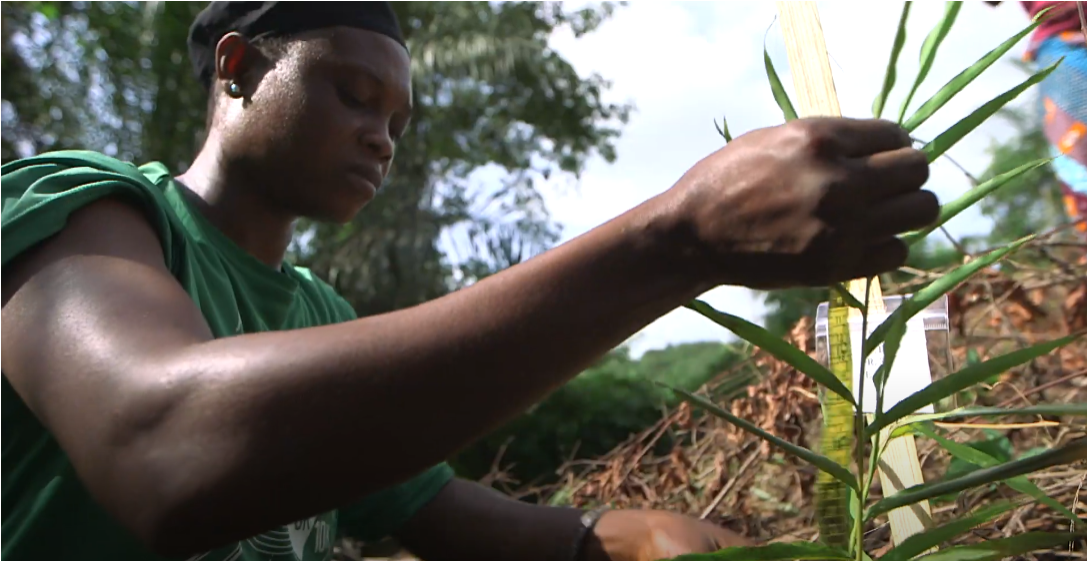
Read more
Related articles for further reading
Roughly 5,000 miles separate the Loreto region in Peru from Bowkrom, a farming community located in eastern Ghana, making it a 46-hour trip that Peruvian activist Betty Rubio gladly undertook. Teaming up with the global organization Youth Bridge Foundation (YBF), Betty travelled to Africa in 2022 to share her expertise in drone usage and Measurement, Reporting, and Verification (MRV) technology to monitor forest cover and support reforestation efforts. Together with YBF, they engage in replanting and monitoring the growth of native plants with cultural and economic value.
Back then, members of the Bowkrom community were invited to participate in a workshop to learn how the community could use an application to collect data on native seedlings planted in eastern Ghana, in order to track the progress of their reforestation efforts. Due to this exchange, they are now following the path of Peruvian communities that have been using the same technology since 2019. This data collection process can help the community calculate carbon credits and determine the mitigation impact of their restoration projects. “It’s important to document all this on the computer for evidence. We will be able to share it with relevant institutions, governments, and the world to show that we are planting trees here and that they are actually growing,” explains Betty. “I feel like planting here is just like being in my community. There really is no difference. I hope these trees grow, and, as they say in my community, ‘my hands stay with what I’m planting’.”
Restoring natural ecosystems by planting trees is not a new solution to addressing the climate crisis. But with one-third of the planet’s land degraded, global efforts to either restore degraded lands to natural forests or productive lands have the potential to generate major economic, employment, and climate benefits. Ghana is leading by example. Available data from naturebase shows that reforestation efforts in the country can lead to 21.82 metric tonnes of carbon emission mitigation each year, if implemented at scale.
However, investing in tree planting for long-term tangible climate, social and biodiversity benefits requires addressing restoration with special attention to protecting native plant species, preserving natural ecosystems and providing a framework for sustainable land management (see Nature4Climate’s Reforest Better guide to high impact tree growing schemes).
In Ghana, the farming community is engaged in planting and managing seeds of Moringa and Prekese, both natives of the country, as well as Guavas and a shrub spice called Efomomen. All of them have medicinal value and have been utilized by communities for centuries. “The plants embody our values and also have antioxidant properties. Some of them can reduce blood pressure and diabetes. The trees were selected for their medicinal value, but they also have economic value. So, if local farmers plant them, they can also make some money from it,” explains Victor Nketiah, the Acting Head of Commercialization at CSIR Bunsur.
The initiative’s success has led the Youth Bridge Foundation to expand its technology training efforts to other African countries such as Kenya, Nigeria, Uganda, and Liberia, thereby broadening south-south cooperation and the use of MRV tools to bolster natural climate solutions on the ground and foster a sense of collective environment stewardship.
Considered a successful pilot of MRV Technology implementation in Africa, the Bowkrom community is not only protecting its biodiversity but also creating new opportunities. “We are looking at a value chain creation where you have one group nursing, another group planting, and another group nurturing. Because the whole idea is to create employment, it is also meant to serve as the sole buffer in restoring forest cover,” summarizes Seth Acheampong, the eastern regional minister.
Nature in action series
Naturebase features real-world stories like this, focusing on people’s experiences as they successfully protect, restore, and sustainably manage their lands across different countries and regions to inspire climate ambition. Additionally, the platform hosts a growing natural climate solutions learning network designed to field-test and evaluate high-impact strategies that can be scaled and replicated worldwide. In doing so, naturebase not only helps stakeholders tackle the challenge of data integration and accessibility but also enables informed decision-making on the implementation of effective natural climate solutions worldwide.
The Nature in Action series, produced in collaboration with community-led filmmakers from If Not Us Then Who, tells stories of people and communities leading the groundwork on nature protection and recovery, highlighting successful nature-based solutions and strong Indigenous and local communities’ leadership that successfully link science, policy and action to positively influence on climate discussions and decision-making for high impact nature-based action. See all films here.
About naturebase
Naturebase is the first online platform that uses science-based data and information to help individuals translate natural climate solutions planning into tangible actions that yield results. A collaborative effort involving people from 59 universities, 21 research institutions, 18 NGOs, and 12 government agencies worldwide, naturebase showcases pathways to protect, better manage, and restore nature for measurable climate benefits.